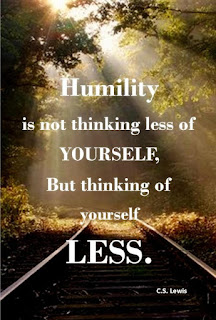I love the joke I heard as a child about the boy who received a medal for being humble, then had it taken away the next day because he pinned the medal on his jacket.
Growing up, I knew that humility was a goal, but it was a tricky one. How do you seek it and still remain humble?
As an adult, I have come to a better realization of the call of humility. The irony of the joke I just shared is that one could argue that the boy should NOT have had the medal taken away. The adults may have been confused between the words modesty and humility. What the boy may have lacked in wearing the medal was modesty, NOT humility.
Let's explore this further.
I recently read Healthy Calling: From Toxic Burnout to Sustainable Work by Ariana Molloy, which reminded me of the important difference between these two words.
Modesty is focused on avoiding attention, even to the point of belittling our accomplishments. It can appear to be a lack of confidence or be phrased as "thinking less of yourself." It can get caught up in being consumed with one's faults and failures.
The modest person looks down, not seeking attention.
But humility is not thinking less of yourself; it is thinking of yourself less (C.S. Lewis). Molloy points out that an identity of humility is not looking to please people, but to please God. The humble person is not blind to their strengths; they are looking to see how their strengths can help others. They are self-aware without being self-consumed.
The humble person looks out and up, seeking to connect with God and others. The humble person sees that they and others are made in God's image.
Therefore, humility is not a personal virtue but a relational one. A humble person prioritizes the needs of a group or relationship rather than focusing on self.
Molloy argues that gratitude is the foundation of humility. Colossians 3:15 says that we are to recognize that we are members of one body and be thankful.
Healthy humility involves three things.
- It is knowing your strengths and weaknesses.
- It means being teachable, embracing an openness to learning.
- It means knowing how to step away, delegate, take a break, and remove yourself from work, trusting that it will be fine without you for a short time. This involves a vulnerability of resting and reflecting, acting on the strong belief that EVERYONE needs refueling.
Another way to think of the three essentials of humility is know, learn, and rest.
So what does this have to do with the call to work?
When we work, we do it with humility, knowing that we have something to offer that is needed. We work hard, and we do it with excellence, looking up to God as our role model for working, and to others for contributing to their flourishing. We are aware of our strengths but it is not for us, but rather for others. We are aware of our weaknesses and seek to partner with others with different strengths, remaining teachable by those different from ourselves, in terms of culture, age, gender, and other forms of diversity. We are in relationships with a global people in a global marketplace where our work releases the potential of others, and the work of others releases our own potential.
It's a beautiful thing. May God bless you this week, as you do your humble work!













